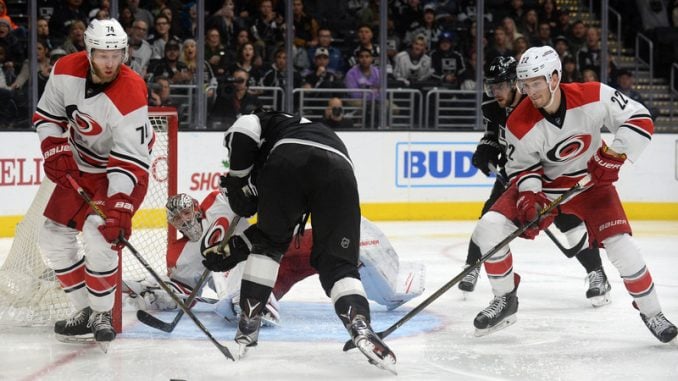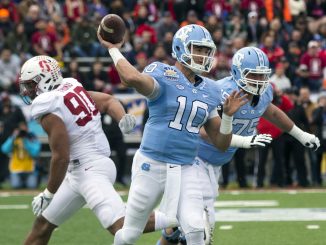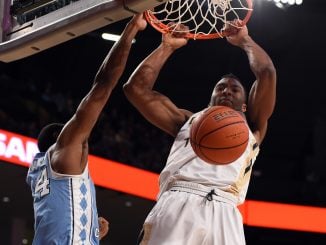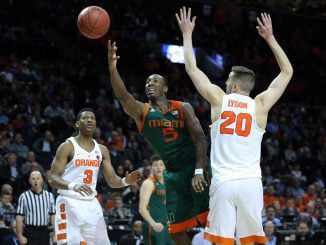
RALEIGH It’s unlikely the Carolina Hurricanes will maintain their torrid penalty killing pace, but it’s no fluke that coach Bill Peters’ team is having shorthanded success.In the last two seasons under Peters and assistant coach Steve Smith, who handles the team’s penalty kill, Carolina’s shorthanded unit has finished fourth (84.7 percent in 2014-15) and fifth (84.3 percent in 2015-16) in the NHL in efficiency.Through Thursday’s win in Los Angeles, the Hurricanes have taken it up another notch this season, ranking No. 1 in the NHL with a 92.0 percent kill rate.Peters said the team’s success on the penalty kill, which has employed five different defensemen and seven forwards in prominent roles, is about system and execution.”It’s a combination of both,” Peters said. “[Smith] does a good job making sure we talk about who’s next man up, making sure that they’re ready to go and they get some reps in practice.”Injuries, particularly to former Selke Trophy finalist Jordan Staal, have led to Carolina using several players shorthanded.”You never know what’s going to happen with injuries, whoever gets a penalty, it might be a guy who usually kills a lot of minutes,” forward Joakim Nordstrom said. “If you lose a guy, it’s always good to have guys to step up. We’ve done a really good job of involving a lot of guys in the meetings and in practices.”That includes AHL call-up Brock McGinn, whose time on the PK in Charlotte prepared him to contribute with the Hurricanes.”That helps out with the adjustment coming up here,” McGinn said. “Just the way we have been working our systems right now in our penalty kill, that is showing in our success out there. Our penalty kill has confidence right now.”The growth of second-year players Brett Pesce and Jaccob Slavin has been evident both at even-strength and on the PK. Slavin leads all Hurricanes with 91:10 of shorthanded time this season, an average of 3:22 a night. Pesce, with 2:25 a night, said a successful kill can carry over to 5 on 5.”I’ve always personally taken pride in penalty killing,” Pesce said. “I think it does 100 percent give momentum for your team. If someone blocks a big shot, it kind of gets the boys going. I take pride in it.”Twenty-seven games into the season, Carolina has allowed the opposition to score just six power play goals, and goaltender Cam Ward who has started 21 of those games has given up just four.Ward’s work on the penalty kill has been a catalyst for his bounce-back season. His current .949 save percentage shorthanded is among the best in the last two decades. Of goalies who have played 20 games in a season, only two goalies have ever produced more impressive numbers. Cory Schneider (.959 save percentage in 33 games with the 2011-12 Canucks) and Cam Talbot (.950 in 21 games with the 2013-14 Rangers) managed better numbers.Which comes back to the initial point: it will be difficult for Ward and the Carolina PK to keep this up. Since the NHL started tracking power play save percentage in 1997-98, only one goalie Colorado’s Simeon Varlamov with a .942 in 2014-15 managed to play more than 40 games in a season and maintain a .930 save percentage while shorthanded.Furthermore, since 1987-88 no NHL team has finished the season killing more than 90 percent of their opponents’ power plays. The 2011-12 New Jersey Devils hold the best mark at 89.6 percent, allowing 28 power play goals that season.Ward’s play and the team’s depth in front of him gives them a chance. Also helping is the fact the Hurricanes are the NHL’s second-least penalized team, taking an average of just 6:44 minutes of penalties a night.And with another shorthanded goal Thursday, Carolina now has three on the season half the number of goals they’ve allowed on the penalty kill.Given the Hurricanes’ struggles scoring, the penalty kill has proven to be essential to keeping Carolina’s season afloat.”Can you imagine if we had an average to below-average penalty kill, where we’d be?” Peters said. “We’d be in a lot of trouble, especially with how tough it’s been for us to score. Now if we’re giving up goals on the penalty kill, then it becomes an even bigger hill to climb.”



